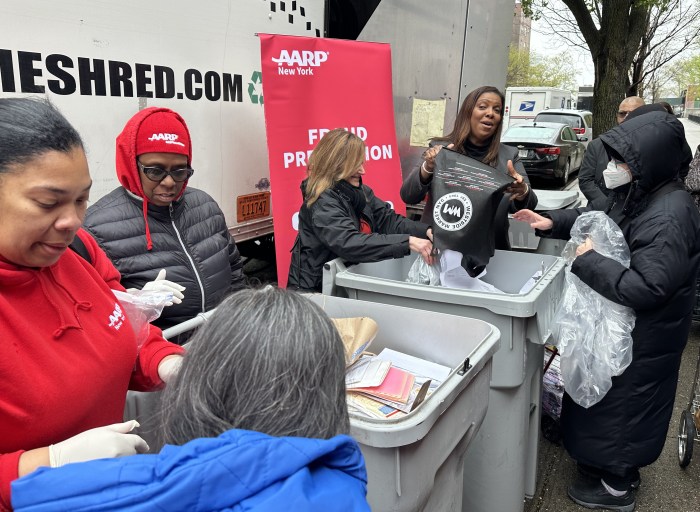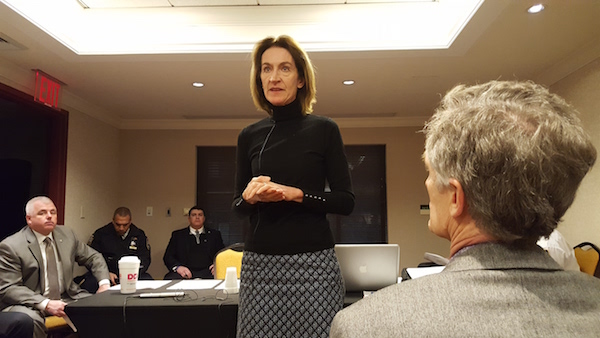
BY DUSICA SUE MALESEVIC | Could a rooftop garden grow on top of the Midtown South Precinct this summer? That tantalizing idea is slowly but surely making progress, said John A. Mudd, president of the Midtown South Community Council (MSCC).
“Our idea is to green the rooftop of the police precinct,” Mudd said at the council’s Jan. 19 meeting. “We got to talk to the higher ups and we got to make sure it’s feasible and make sure it’s safe. There’s still a lot of work to do.”
The precinct’s commanding officer, Inspector Russell Green, is on board with the idea, Mudd said. Earlier this month, on Jan. 4, Green, MSCC members, a structural engineer, and Joe Winter and Daniel Mintz of Inner City Farmer (innercityfarmer.com) met to discuss logistics and how to move the project forward.
Mudd said that in addition to One Police Plaza approval, there is Department of Buildings code questions to work out (Midtown South Precinct is located at 357 W. 35th St., btw. Eighth and Ninth Aves.).
The vegetables produced may be given to the homeless as well as those who work at the precinct, and there also may be job opportunities for the homeless, Mudd noted, adding, “I think it’s really exciting. I think it could really maybe be part of a movement.”
Last summer, Winter and Mintz had a rooftop garden on top of 205 W. 39th St. (btw. Sixth and Seventh Aves.), where sweet potatoes, eggplants, peppers, collard greens and tomatoes were grown, Mintz told Chelsea Now after the meeting, which was held at The New Yorker hotel (481 Eighth Ave., btw. W. 34th & 35th Sts.).
Winter started Inner City Farmer, whose mission is to donate at least 50 percent of “premium quality fresh produce to those who cannot pay for it.” Mintz said they donated vegetables last year to a nearby women’s shelter and church.
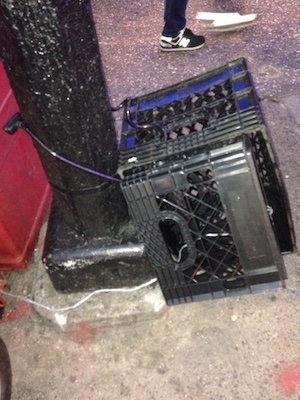
In addition to the rooftop garden, the Council has other improvement initiatives in the works. The Council is proposing fixed installations of magazine and newspaper boxes to replace plastic ones, Eugene Sinigalliano, the council’s beautification director, said.
Sinigalliano said there are already some fixed installations in front of Penn Station and around Grand Central Station.
“Those are great, and they do solve part of the problem, but they’re too big and bulky for the narrower sidewalks,” he said, noting that the Council “is going to sponsor a design contest to design a multi-box unit that will [be] low maintenance [and] will be graffiti resistant.”
Mudd said in a Jan. 21 email that the Council is expected to announce the specifics of the contest in upcoming weeks.
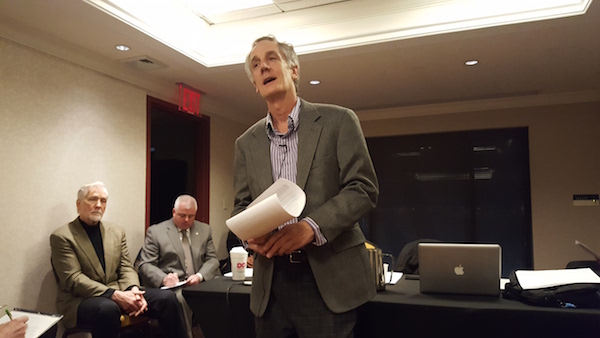
Sinigalliano said that according to Department of Transportation regulations, only multi-unit boxes are allowed to be fixed. The Council is hoping these new boxes will stop people turning over the current plastic holders to sit on.
Mudd said they are also working on removing postal crates and street furniture, and plan on putting up signs in problem areas — such as W. 42nd St. and Eighth Ave. where numerous bikes, some derelict, are attached to a fence.
The blocks around the Port Authority on Eighth Avenue has gotten to be an obstacle course, he said in an email.
The Council continues its focus on homelessness, with the first phase of an app slated to be rolled out in March.
“When we found out that many [services] were being duplicated, and inefficiencies were happening, we thought we need some sort of app in action,” Sharon Jasprizza, MSCC’s director of community services, said.
The app will put together services — and relevant details, such as addresses, contacts and what they offer, she explained. For instance, if a homeless person needed shelter for the night or a doctor, the app could tell them where to go, Jasprizza said.
The speaker for the evening also focused on the homeless issue. Marc Greenberg, executive director of Interfaith Assembly on Homelessness and Housing (iahh.org), spoke about what his organization does to address homelessness, including working on public policies that help produce housing, as well as preventing homelessness.
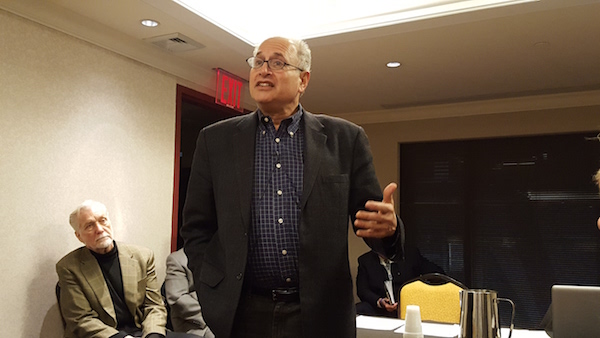
“One of the issues we’re working on is to try to establish the right to legal counsel in housing court,” he said.
During eviction proceedings, around 90 percent of landlords have an attorney whereas about 10 percent of tenants have representation, according to Greenberg.
He said the organization estimates that about 10,000 households a year that are evicted because they don’t know their rights. “Many people get an eviction notice, they don’t even go to court, they just say, ‘Please give me some time, I’ll leave,’ ” he noted.
With the city spending anywhere from $30,000 to $35,000 to keep a family in a shelter, it costs less to defend them in housing court, Greenberg said.
“The biggest bang for your buck,” he said, “is keeping people from losing their homes in the first place.”
Visit midtownsouthcc.org for more information about the Midtown South Community Council.










